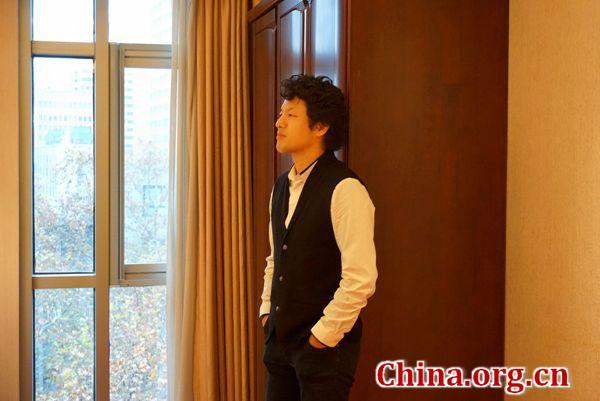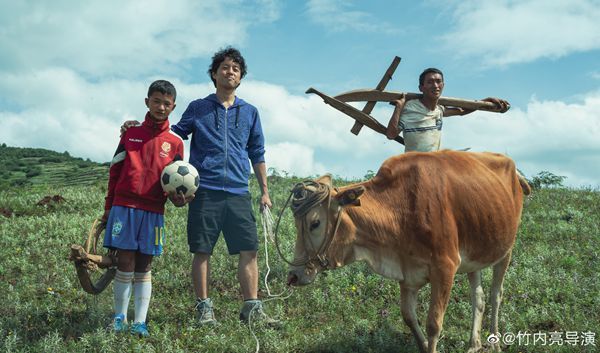"I will keep making documentaries that expose global viewers to Chinese culture and present foreign culture to Chinese," Japanese director Takeuchi Ryo said during a recent interview with China.org.cn.

Japanese director Takeuchi Ryo (Photo: China.org.cn)
Takeuchi rose to fame this year for his hit documentary series that captured how regular Chinese responded to and recovered from the COVID-19 epidemic.
Takeuchi's two documentaries, titled "Nanjing's Anti-epidemic Scene" and "Long Time No See, Wuhan," went viral in both China and Japan and have been translated into over ten languages and garnering tens of millions of views on social media platforms.
"The reason for filming 'Long Time No See, Wuhan' is that during the epidemic, many people around the world, including Japanese, had misunderstandings and prejudices toward Wuhan," Takeuchi said. "I hope to show them what real Wuhan is like through my lens. 'Nanjing's Anti-epidemic Scene' was also filmed for this reason."
He revealed that he is currently making a documentary on the theme of "China in the post-epidemic era."
"COVID-19 has changed the way people live and work and spawned new business models. China is one of the few countries that has controlled the coronavirus and gradually entered the post-epidemic era. I want to share China's experience with other countries through film."
Another documentary directed by Takeuchi that is soon to be released online focuses on the story of poverty alleviation in Liangshan Yi autonomous prefecture in southwest China's Sichuan province. The documentary was filmed in July in cooperation with the China International Publishing Group and editing has been completed.
Takeuchi said that he had been to Daliang Mountains a decade ago when he was filming "The Yangtze River" for Japan's largest national broadcaster NHK. At that time, his impression of the Daliang Mountains was "extremely poor."
"At that time, I could only ride a donkey in that mountainous place," Takeuchi said. "I can't believe that such a remote and impoverished place could shake off poverty within ten years. I was skeptical about that." So he decided to see for himself.
After filming, Takeuchi said he was amazed at the changes he saw in the Daliang Mountains. "It's totally different than before. The transportation is very convenient and you can drive to places that could only be reached by donkey before. The people now live in free resettlement houses provided by the government."
"But true 'poverty alleviation' still requires a change of mindset," Takeuchi said bluntly, noting that education and access to information are also important for poor people.

A photo posted by Japanese director Takeuchi Ryo on his Weibo in July during the filming of his latest documentary about poverty alleviation in Liangshan Yi autonomous prefecture in southwest China's Sichuan province. (Photo: courtesy of Takeuchi Ryo)
Many of Takeuchi's documentaries are unscripted and he said that he always tries to be neutral and objective in presenting eyewitness accounts.
"The western media often defame China based on information that isn't truthful or agreeable. Therefore, I try to pursue authenticity and objectivity in my documentaries," stated Takeuchi.
Prior to his pandemic-related documentaries becoming a sensation, Takeuchi was already known by many in China for his role in the long-running documentary series "The Reason I Live Here," which depicts stories of Chinese living in Japan and Japanese living in China.
The 42-year-old director has been living and working with his Chinese wife in the eastern city of Nanjing for seven years. He said that he enjoys recording the life of ordinary Chinese people because China is an "interesting country with rapid change."
"I have seen incredible changes in China even in the past seven years since I came here. There was no Alipay, bike-sharing, food delivery, and Douyin then. The internet and technology have developed in leaps and bounds. In contrast, Japanese society has plateaued in recent years."
Takeuchi believes that the experience of working for NHK from 2001 to 2012 gave him an edge in cultural transmission because he understands what Japanese audience want to watch.
"If you want to do well in international cultural transmission, you need to understand how to present the culture for the targeted audience in different countries," Takeuchi explained.


